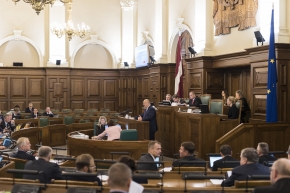 Galerie
Galerie
On Thursday, 5 November, the Saeima reviewed the Final Report drafted and adopted by the parliamentary inquiry committee on the Zolitūde tragedy.
“A lot of work has been accomplished, and all the Committee members can be proud of it. At the same time, the implementation of the Committee’s proposals depends on the willingness of the relevant institutions and officials to genuinely improve the legal framework and the performance of the public administration,” said Ringolds Balodis, Chairman of the Committee.
The Committee has examined irregularities in the functioning of the relevant state and municipal institutions, as well as the legal framework, and concluded in the Final Report that, probably, the existing state and municipal construction policies led to the tragedy. The Committee also has raised the issue of the political responsibility.
The Committee points out in the Final Report that the dissolution of the State Construction Inspection Office considerably weakened supervision of the construction sector and made it impossible to implement uniform national construction policy. Supervision at the national level was only resumed after the Zolitūde tragedy, when the National Construction Control Agency was established. Before the Tragedy, all attempts to reinstate supervision at the national level were unsuccessful due to the lack of funding.
“The Committee has also indicated the individuals that were morally and politically responsible for the political and administrative choices made in the area of supervision of the construction sector, namely, Valdis Dombrovskis, former Prime Minister; Artis Kampars and Daniels Pavļuts, former Ministers of Economics; Anrijs Matīss and Juris Pūce, State Secretaries, who held the position during the office of the ministers,” Chairman Balodis pointed out.
The Final Report also concludes that the construction supervision system established at the Riga municipality was ineffective and excessively fragmented, the system for certification of construction specialists and monitoring of the construction product market could not ensure safety in the construction sector, and the relevant laws and regulations had several irregularities regarding the responsibility of the individuals and entities involved in the construction process, as well as in the area of ensuring effective supervision on the part of the relevant institutions. “Therefore, the Committee has also named Nils Ušakovs, Mayor of the Riga City Council, and Inguss Vircavs, Head of the Riga City Construction Board, as politically and morally responsible for the tragedy,” said Balodis.
The Final Report includes the Committee’s proposals for improving the legal framework and the work of state and municipal institutions. Several proposals are dedicated to strengthening of the requirements for construction design expertise, safety of structures, and increasing responsibility of the individuals and entities involved at various stages of the construction process. It is also proposed to define the term ‘public building’ more precisely and make several other improvements in the existing legal framework.
Members of the Committee have pointed out the need to improve the professional higher education study programmes for construction specialists, the need to draft and adopt a law on lobbying transparency, to develop clear and uniform procedures for the institutions involved in responding to emergencies, to upgrade and modernise several firefighting depos and rescue equipment, as well as the need to develop clear guidelines for providing social assistance in emergency situations.
Furthermore, the Committee has reviewed the available information regarding the investigation conducted by the State Police, and has concluded that at this stage of the criminal proceedings there are no grounds for accusing the State Police for delaying the investigation. The quality of the investigation will be assessed after the litigation.
The Final report is available at the website of the Committee.
The Zolitūde tragedy took place on 21 November 2013, when 54 people died as a result of the roof collapse in the supermarket “Maxima”. This is the most tragic incident in Latvia since the regaining of independence.
According to the Law on Parliamentary Inquiry Committees, after the Final Report is published, the proposals are forwarded to the Saeima committees, the Cabinet of Ministers, relevant ministries and other institutions responsible for implementing the proposals. The institutions indicated in the Final Report will examine the findings and decide on measures to be taken in order to address the irregularities identified by the Committee.
The law also stipulates that a parliamentary committee is dissolved on the 8th day after the Final report is considered by the Saeima, unless the Saeima decides otherwise.
Saeima Press Service







